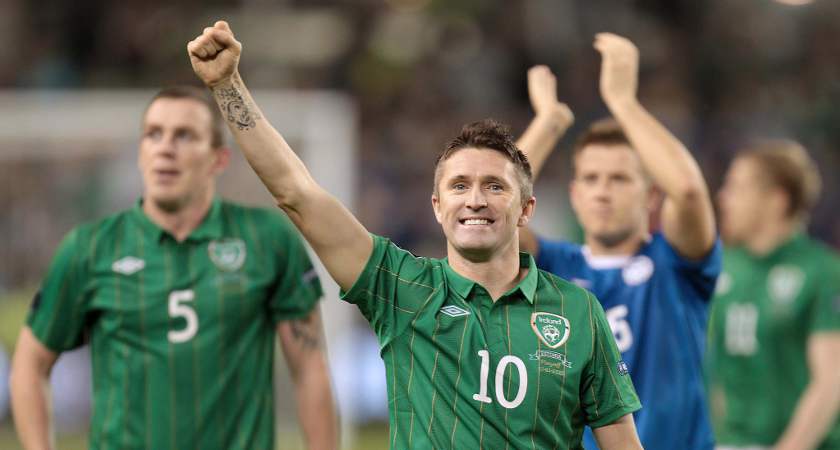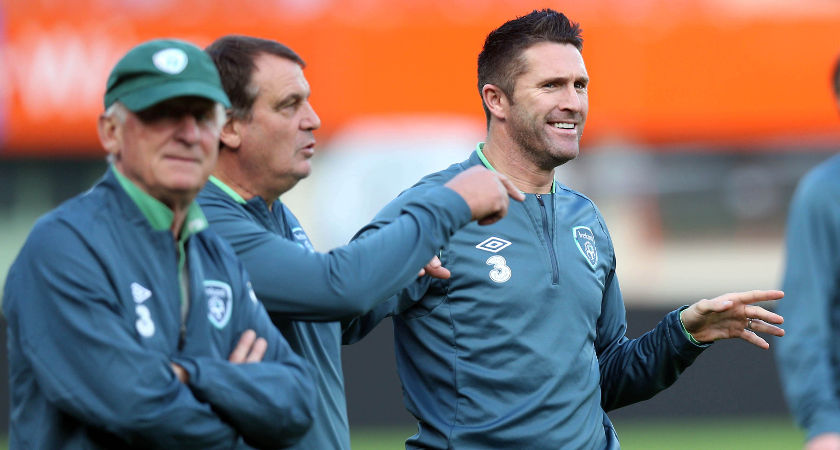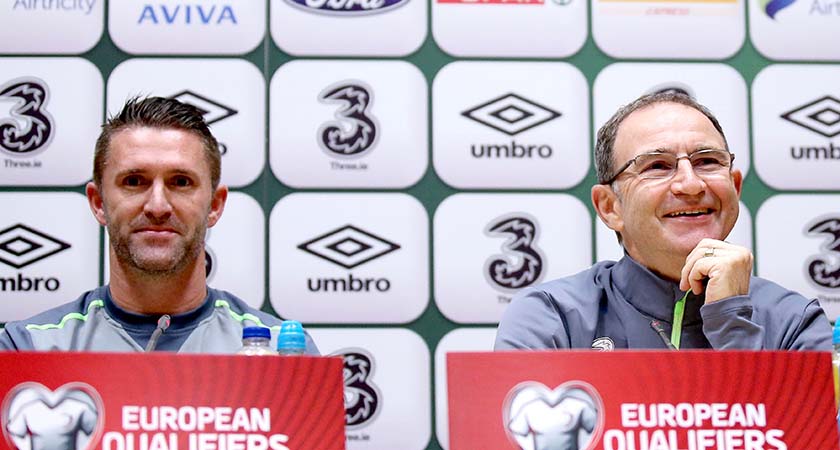THERE was an interesting exchange on Twitter last Wednesday in the aftermath of Robbie Keane’s decision to announce his retirement from international football.
After posting his tribute to the former Ireland captain, ‘trolls’ immediately undermined Jason McAteer for suggesting Keane was one of the few world class players Ireland has produced.
ROI have only had a few world class players Robbie Keane was one of them absolute pleasure to call you a team mate pic.twitter.com/NfFwGtNk34
— Jason MCATEER (@MCATEER4) August 24, 2016
@MCATEER4 your at the wind up here surely?? Very good player and great career but WORLD CLASS.....behave.
— Willie Campbell (@williec2811) August 24, 2016
@williec2811 Ireland against crap teams.v over rated by media.baffling that mcateer gets paid for a deluded opinion
— Niall Purcell (@purcelln421) August 24, 2016
@MCATEER4 @CelticRebelArmy we've had loads of world class players. Robbie wasn't one of them.
— Damien Hanley (@damien_hanley) August 24, 2016
To all the nuggets out there Robbie Keane is 5th all time European goal scorer at international level enough said
— Jason MCATEER (@MCATEER4) August 24, 2016
While there was a certain amount of validity in questioning whether Keane’s talents ever reached world class levels, the overall point wasn’t missed. That even on the day he pulled the curtain down on an 18-year international career, a certain level of disdain for the country’s record goalscorer, and caps holder, was evident.
It has been there for some time. Goals were his currency yet they continue to be devalued – one troll who went to social media war with McAteer expressed the view that so many of them came against ‘teams who were sh**e’.
That was the perception. Here is the evidence. Sixty-seven times Keane scored for Ireland; more than Frank Stapleton, Don Givens and Niall Quinn – the second, third and fourth highest scorers in the country’s history – combined.
That he also scored more goals than any other player in European Championship qualifying history shouldn’t be readily dismissed, either; nor the fact that he found the target on 44 occasions in qualification or finals games, including five times in major tournament play-offs, and three times in the 2002 World Cup.
 No one has scored more goals in European Championshio qualifying than Keane [Picture: Inpho]
No one has scored more goals in European Championshio qualifying than Keane [Picture: Inpho]“He did it against Germany, Holland, Spain,” McAteer said. And to that list you can add the following names: Yugoslavia, Sweden, Russia, Turkey, Italy, France, Iran, Saudi Arabia, Albania, Wales, Georgia, Cyprus, Israel, Macedonia, Estonia and Kazakhstan.
The above goals came in key qualification or finals games. A flat track bully he most certainly was not. Yet loved? At best, the level of affection (within Ireland) was mixed, a source of annoyance to his team mates.
"Whenever we were abroad, Robbie was the face of our team,” said Shay Given. “So when you’d go to different parts, they'd be all wanting to have pictures with Robbie. Sometimes that gets lost a little bit in Ireland because different quarters, and different sections, would be giving him stick and stuff. He was the most famous player we had, a player that fans around the world look up to. And sometimes Irish fans, for whatever reason, didn't appreciate how good he was. But we'll probably look back in 10 or 20 years and realise then that his record is untouchable."
![Shay Given and Robbie Keane will soon be waving goodbye to the Ireland set-up [Picture: Inpho]](https://media.irishpost.co.uk/uploads/2015/08/Shay_Given_Robbie_Keane_N.jpg) Shay Given and Robbie Keane have both now waved goodbye to the Ireland set-up [Picture: Inpho]
Shay Given and Robbie Keane have both now waved goodbye to the Ireland set-up [Picture: Inpho]And therein lies the crux of the matter. At 36, Keane is still prepared to board a trans-Atlantic flight and travel across to Dublin, something he has been doing for 18 months, even though he knew the most he could hope for was a place on the bench.
His team-mates loved him, no matter what stage of his international career he was at.
“He wasn’t just our record goalscorer,” wrote Tony Cascarino in his Irish Sun column. “What was just as important in my book was the fact that he always turned up. I remember when I first started in the Ireland squad. I’d be gobsmacked to see Liam Brady travelling halfway across Europe to join us for some friendly in the middle of nowhere. It was a lesson to me that if one of Ireland’s all-time greats was going to put in such a huge effort for the country, then the rest of us had to too.
“Robbie is just like Liam. It would be easy to skip a game or two but he was always there and that rubs off on other people. He’s a legend – and a great guy too.”
If his personality wasn’t initially appreciated then the course of time served to change that, particularly when he grew into the captaincy role after a troubled first campaign during Steve Staunton’s reign.
When Giovanni Trapattoni arrived, the armband seemed to fit so much better, a point Don Givens made to Trapattoni after working closely with the Dubliner during his reign as caretaker boss.
 Former Republic of Ireland manager Giovanni Trapattoni, Marco Tardelli and Robbie Keane [©INPHO/Donall Farmer]
Former Republic of Ireland manager Giovanni Trapattoni, Marco Tardelli and Robbie Keane [©INPHO/Donall Farmer]By now he was maturing and what inadvertently helped was the vacuum Trapattoni’s long silences left in the dressing room before games and at half-time. Keane, Given and, surprisingly, Stephen Hunt filled the void and the Italian’s trust in Keane was rewarded with goals too. The best period of his international career came during Trap’s tenure.
During the Staunton era, he had a habit of talking a lot but saying little, aside from general platitudes.
This all changed in Paris in 2009. After losing the first leg of the World Cup play-off 1-0, he delivered a primal rallying cry in the pre-match press conference and the tone for the following night's performance was set.
A year later, he used the press for his own needs again. Angry with Jon Walters, James McCarthy and Anthony Stokes – who for one reason or another, failed to appear for a crucial qualifier away to Macedonia, he cut loose.
A questionable strategy was rewarded. McCarthy and Walters’ commitment has improved dramatically since. More to the point, Keane backed up his outspoken comments with two priceless goals in a 2-0 win.
“He played that game with a painkiller,” Trapattoni said. “He showed real leadership.”
 O'Neill valued Robbie's contributions off the field as much as anything [©INPHO/James Crombie]
O'Neill valued Robbie's contributions off the field as much as anything [©INPHO/James Crombie]For this, Keane was credited. He had learned his lesson from the Staunton era and worked on making newcomers feel more at home. The ritual, where a newly appointed player has to sing a song of his choice in their first week in camp, has become popular.
“I was mortified when it was my turn,” said Keith Treacy. “I hated the thought of it. But it broke the ice. I sang the first verse of You’ve Lost That Loving Feeling and by the chorus the others had all joined in. Did it make a difference to how I felt around the squad? Absolutely. I felt a hell of a lot more comfortable around the lads from there on in.”
Aside from acting as a makeshift X-Factor judge, Keane has also learned how to play the political game. He and John Delaney, the FAI CEO, speak regularly. Throughout the summer he was in regular touch with Delaney about the best way to handle his retirement. They settled on a farewell game against Oman.
And yet you sense this won’t be goodbye. More of a ‘see you later’. Keane is bound to return in some coaching or ambassadorial capacity.
There is another chapter of the Keane-Ireland story still to be written.
Pictures: Inpho

